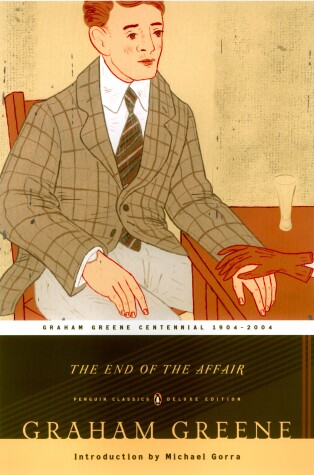
"A story has no beginning or end: arbitrarily one chooses a moment of experience from which to look ahead..."
"This is a record of hate far more than of love," writes Maurice Bendrix in the opening passages of The End of the Affair, and it is a strange hate indeed that compels him to set down the retrospective account of his adulterous affair with Sarah Miles. Now, a year after Sarah's death, Bendrix seeks to exorcise the persistence of his passion by retracing its course from obsessive love to love-hate. At first, he believes he hates Sarah and her husband, Henry. Yet as he delves further into his emotional outlook, Bendrix's hatred shifts to the God he feels has broken his life, but whose existence at last comes to recognize.
Originally published in 1951, The End of the Affair was acclaimed by William Faulkner as "for me one of the best, most true and moving novels of my time, in anybody's language." This Penguin Deluxe Edition features an introduction by Michael Gorra.
For more than seventy years, Penguin has been the leading publisher of classic literature in the English-speaking world. With more than 1,700 titles, Penguin Classics represents a global bookshelf of the best works throughout history and across genres and disciplines. Readers trust the series to provide authoritative texts enhanced by introductions and notes by distinguished scholars and contemporary authors, as well as up-to-date translations by award-winning translators.
Graham Greene intimidates the hell out of me, the way he handles not only words but the massive themes of life with such quiet, disquieting precision. To read his books is to be sliced through with a knife, turned inside out, recounting the stock of all you believe and all you doubt. There are my favorite books, and then there are the essentials: this book is without a doubt, immediately both.
“The sense of unhappiness is so much easier to convey than that of happiness. In misery we seem aware of our own existence, even though it may be in the form of a monstrous egotism: this pain of mine is individual, this nerve that winces belongs to me and to no other. But happiness annihilates us: we lose our identity.”
“(...)He was not Sarah’s enemy so much as the enemy of love, and isn’t that what the devil is supposed to be? I can imagine that if there existed a God who loved, the devil would be driven to destroy even the weakest, most faulty imitation of that love. Wouldn’t he be afraid that the habit of love might grow, and wouldn’t he try to trap us all into being traitors, into helping him extinguish love? If there is a God who uses us and makes his saints out of such material as we are, the devil too may have his ambitions; he may dream of training even such a person as myself, even poor Parkis, into being his saints, ready with a borrowed fanaticism to destroy love wherever we find it.”
“But what’s the good, Maurice? I believe there’s a God— I believe the whole bag of tricks, there’s nothing I don’t believe, they could subdivide the Trinity into a dozen parts and I’d believe. They could dig up reasons that proved Christ had been invented by Pilate to get himself promoted and I’d believe just the same. I’ve caught belief like a disease. I’ve fallen into belief like I fell in love.”
Reading updates
-
Started reading
-
1 May, 2009:
Finished reading
-
1 May, 2009:
Reviewed
